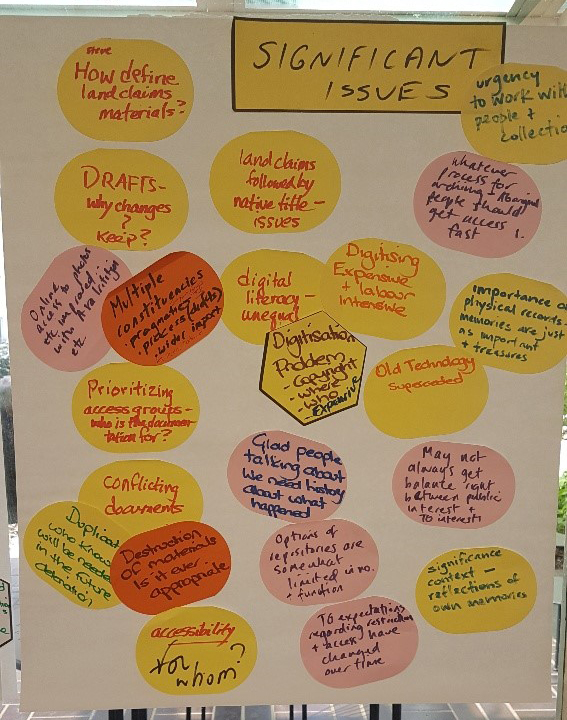Documenting and preserving the records and memories
Since the late 1970s, a significant amount of research material has been generated in preparing claims to be heard under the Aboriginal Land Rights Act (Northern Territory) 1976. These materials include anthropological, linguistic, historical, archaeological and legal research documents, field notes, photographs, genealogies and audio-visual recordings.
These records are highly significant; not only for Aboriginal cultural heritage but for the heritage of all Australians. Because of their age, in some cases over 40 years, and the outdated technical formats of these materials, these research collections are vulnerable and at high risk of being damaged and becoming indecipherable. The memories of now aged claimants and practitioners have often diminished with the passing of time. Some memories may already be lost.
AIATSIS and Latrobe University entered into a research partnership in 2019 for Stage One of a project to identify and preserve these important records. Aboriginal Land Rights in the Northern Territory: Documenting the Records and Memories (the Project) is governed by an advisory committee chaired by Australian National University (ANU) Emeritus Professor and Northern Territory Treaty Commissioner, Michael Dodson with representatives from the Northern and Central Land Councils (NLC and CLC), the Office of the Aboriginal Land Commissioner (ALC), the Northern Territory Aboriginal Areas Protection Authority (AAPA), the National Archives of Australia (NAA), AIATSIS and La Trobe University.
The Project aims to:
- secure support to ensure the safety, preservation and documentation of land claim ‘back story’ records
- encourage practitioners to get started in preparing their own records
- work towards new approaches to cataloguing, digitising and managing returns to enable appropriate access and
- record and publish practitioner and claimant memories.
The ultimate aim is to put control of appropriate materials back in the hands of the relevant Aboriginal and Torres Strait Islander communities and recognise their rights to control their knowledge, cultures and stories while being mindful of the concerns of those who hold materials in their collections and who played significant roles in their production.
AIATSIS and La Trobe held a landmark focus group meeting with around 40 participants in Canberra in October 2019. The meeting was a conversation between land claim researchers and lawyers involved in land rights claims and who have relevant archives with archivists from the National Archives of Australia, the Northern and Central Land Councils, the Office of the Aboriginal Land Commissioner, the Northern Territory Aboriginal Areas Protection Authority, and AIATSIS.
Participants identified a number of challenges and priorities in the enormous task of working through land claim archives including:
- considering issues of ownership and intellectual property and where to deposit
- thinking through access protocols that respect Indigenous interests and those of the wider public
- providing provenance, history of ownership and source of the materials
- identifying materials that are of primary interest to Aboriginal and Torres Strait Islander people, such as photographs, films, videos, sound recordings, genealogies and maps.
In early 2020, AIATSIS commenced a preliminary pilot study, First Glance: Surveying your Land and Native Title Claim Archives with two land claim practitioners. The pilot study informed the development of a draft template that facilitates a ‘first glance’ assessment of an archive, particularly in the absence of the collection holder and provides the basis for discussions about deposits, returns and the legal status of particular documents.
This template has been peer-reviewed but remains as a draft to be trialled and to obtain further advice around the documenting of digital archives. The draft is released now to encourage land claim and native title researchers to survey their personal archives and begin their documentation. The documentation is the first step in keeping your archives safe and to eventually facilitate potential return to relevant Indigenous organisations, land councils and NTRBs/SPs and/or for deposit in other receiving institutions.
Resources
- First glance: A draft template for surveying your land and native title claim archive (DOCX, 646KB)
- Aboriginal land claims in the Northern Territory: Documenting and preserving the records and memories, report (PDF, 1,387KB)
- Aboriginal land claims in the Norther Territory: Documenting and preserving the records and memories, brochure (PDF, 6,799KB)
Project team
Christiane Keller
Toni Bauman
David Parsons

